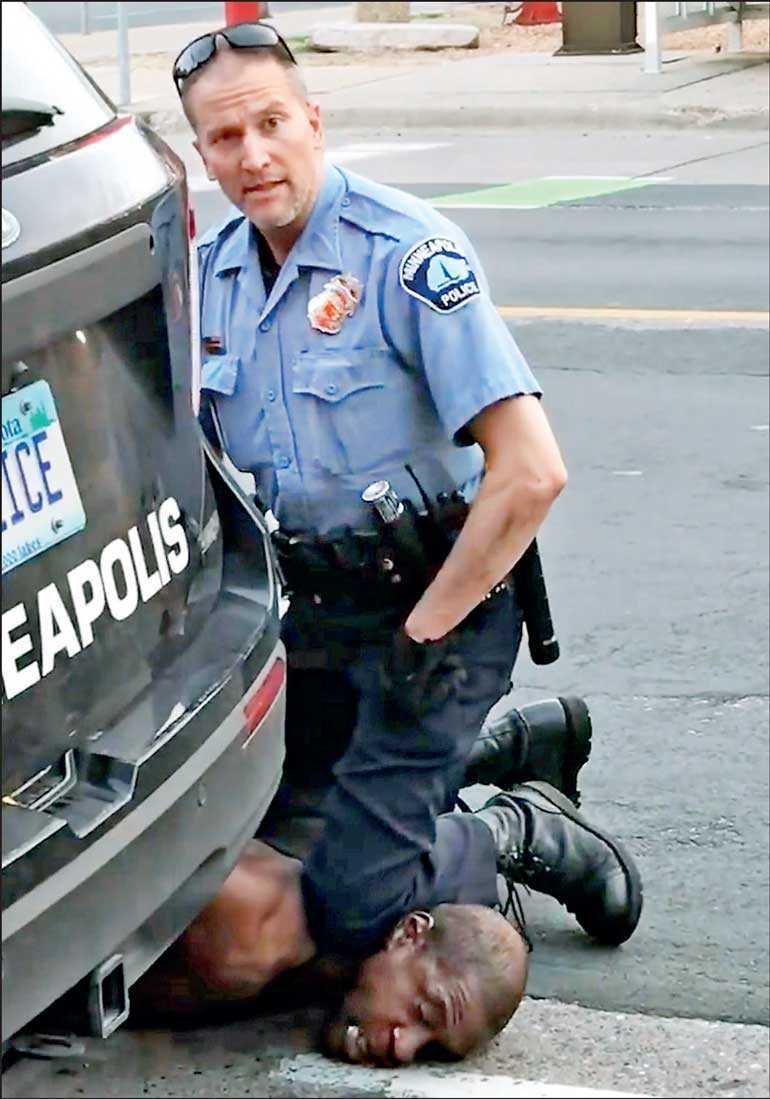Tuesday Feb 17, 2026
Tuesday Feb 17, 2026
Wednesday, 24 June 2020 00:00 - - {{hitsCtrl.values.hits}}

Year 2020 is going to be an exceptional year for many reasons. We are only half way through it. First it was the coronavirus pandemic, still continuing. Then came the economic recession as a consequence of it. Now we have the ongoing protests worldwide, highlighting the systemic racism and police  repression. Protesters are not particularly concerned about the health precautions. Right or wrong, the correction of aliments in society appear to be more important for them than the apparent health risks.
repression. Protesters are not particularly concerned about the health precautions. Right or wrong, the correction of aliments in society appear to be more important for them than the apparent health risks.
The present is an international crisis questioning (1) the still prevalent systemic racism particularly in Western countries, (2) the deadly neglect of the global environment by all countries, (3) the widespread injustices in the economic system/s, (4) the apparent neglect of health concerns of the people, (5) the exorbitant social way of life particularly of the filthy rich, and (6) also the still repressive nature of the State, particularly the Police, even under ‘democracy.’ This is not to reject all progress that humans have achieved during the past two millennia or even before. But to question the still prevailing anomalies, contradictions, injustices, inequalities and repressions.
A crisis is also not completely a hopeless situation. It has or can creates opportunities. Therefore, the future of humanity might depend on the way the prevailing problems are handled by (a) all politicians, left and right, (b) all countries, rich and poor, (c) the civil society activists and organizations, and (d) also the ordinary citizens, you and me. The academics, the journalists, the writers, the professionals, the businessmen/women, and opinion leaders have different but important roles to play. The role of the young women and men is of paramount importance.
Even before
Even before the coronavirus pandemic, there were all indications that the world was going in the downhill. The election of Donald Trump as the President of USA in 2016 was a clear landmark. There were claims that the election campaign was manipulated by Russia. These were the two super powers, one in a different name, that dominated the world after the world war two. The world was moving in a conservative and an irresponsible direction. Another indication was the election of Boris Johnson in Britain promising to break away from the EU last year.
Whatever the weaknesses, the EU opened up new vistas for economic cooperation although in a limited manner. A new equitable international economic order is now necessary. While the idealistic globalisation is childish, international cooperation is a must for progressive economic and social transformations. Going against this trend, America started a trade war against China, and China has now initiated a similar trade war against Australia, whatever the latter’s mistakes. The new rightwing trends also were against international migrants and refugees almost all over the world.
If the rise of fascism in 1930s and the destruction during the Second World War (1939-1945) were any indication, the world should have worked towards a more equitable economic and social systems eradicating poverty and resolving the gaps between the rich and the poor, globally and in between countries. However in the name of economic growth and modernisation, these problems and gaps were enhanced. These have been the major international failures before the eruption of coronavirus pandemic, keeping millions of people in poverty, malnutrition and ill-health.
Coronavirus pandemic
It is a mistake to consider the coronavirus pandemic is over. It has been continuing due to the failures in medical scientific research without being able yet to find a suitable vaccination. Medical research worldwide has been focusing mainly on marketable pharmaceutical products. The spread of the virus is also a question of neglect of required hygienic conditions particularly in public markets and other places.
Although the virus was first erupted in China, who knows whether it was/is prevalent in other countries due to the neglect and pollution of the environment? There are indications that it might be the case. There are cases in various countries where origins cannot be easily traced.
When the virus erupted even before becoming a pandemic, the leaders of various countries blamed each other rather than mutually cooperating in containing its spread. Trump pointed his finger towards China, the name pronounced in a racist fashion. There are other countries who readily followed Trump’s example, including Australia. Then China also became aggressive confronting other countries and particularly Australia. Boris Johnson blamed some of the EU countries (France, Italy and Spain) for spreading the virus into Britain’s territory.
Who has send the virus to poor Latin American and African countries? They are unfortunately not in a position to join the ‘blame game’ because they are largely dependent on these rich countries. The global cases at present are nearly 8 million and 6 percent of them, or nearly half a million, are already dead. According to the Johns Hopkins University data, the most affected 10 countries at present in terms of detected cases are US, Brazil, Russia, India, UK, Spain, Italy, Peru, France and Germany. More or less, these are also the countries where there are highest number of deaths.
It is very clear that the so-called epicentre has now shifted from Europe to Latin America. It might come to Africa next and India also can become an epicentre. At the beginning it was in China, and there is a possibility that a second wave might again erupt there. With most European and North American countries relaxing their lockdowns for obvious economic reasons, there is also a possibility of second waves erupting there as well.
What has become primarily revealed so far is that apart from the old aged people, the number of deaths and death rates (however you counted them) have depended on poor and insufficient health facilities in the affected countries. This reveals a fundamental defect in the present health systems even in most developed countries.
Economic recession
The global economy is predicted to shrink this year by around 6%. The previous prediction (April) was half of this percentage. These are from the World Bank and the IMF. If second waves take place in countries like China, USA, India or countries in the EU, the economic contraction might be much higher.
A recession is normally a contraction in the business cycle due to demand not meeting the supply. But this recession is different. The economies had to be locked down, due to health reasons. Some countries also installed long term curfews. Although the demand was there even with shopping frenzies at the beginning, the supply could not be supplied due to the lockdowns.
The production also largely stopped, and the world trade became halted and/or the transactions delayed. The borders were virtually shut. Unemployment went high and ‘uncertain-employment’ also came into the common vocabulary. Then the consumers became protective although large cash incentives were given by various governments. Some of the conservative governments suddenly appeared ‘socialist’ or ‘welfarist’ with these incentives. Then new aspirations came into the people’s mind.
Of course the lockdowns were or may be necessary due to (1) unknown factors of the virus, (2) initial high death rates, and (3) the lack of knowledge on necessary preventive measures etc. However, all these were due to the unpreparedness within or neglect of the health sectors. Profit making instead of people’s health and welfare has been the norm in socio-economic systems in the world for a long time.
Black Lives Matter
With the pandemic and the lockdowns, all the scum and dirt in the world also have started to surface like in a tsunami. Derek Chauvin, a Minneapolis police officer, kneeled on George Floyd’s neck for nearly nine minutes, obviously to kill him. Black lives did not matter to him. He obviously believed that under Trump’s administration and silence under pandemic guidelines no one would notice his behaviour, let alone protest. However that was not the case.
Now another black life has been taken away by a police officer in Atlanta. The suppression of blacks in the United States and other countries has a long history. It goes back to slavery and colonialism. Racism in society has many forms. Colour of the skin, ethnicity and even the caste represent all shades of racism. Police repressions in society also has more roots, repressing the poor of their own color, ethnicity or the same caste. In modern society, class or caste is also a different race. The application of rules and laws are discriminated depending on the race.
Police repression is rooted in the repressive nature of the state even under democracy. In the absence of democracy, the repression obviously is more severe. Bureaucracy in most countries also act as the police. Some of the politicians are the same. This is a dilemma in most democracies or part-democracies as well. The solution is not to discard democracy, but to reform and expand democracy in order to incorporate all people on an equal basis. Human rights can be the criteria, not merely in words but in deeds.
One of the most positive developments in the present international crisis is the widespread protest movements that have emerged not only in the US but also internationally. UK, France, Germany, Australia and many other countries have joined the ‘black lives matter’ protests. Those countries including Australia have their own problems in this respect. In Australia, it is mainly about Aboriginal lives.
In all spontaneous movements there are possibilities of the emergence of violence and extremism. Although some political leaders tried to oppose such protests on the pretext of ‘social distancing’ and other requirements of the pandemic, what they pathetically have failed to answer so far are the necessary reforms in order to allay the protesters’ justified demands and requests.
Necessary reforms
Reforms are urgently necessary globally to address the present repressive nature of the Police. Police is a major remnant of the pre-democratic oppressive State. Instead of partial reforms, overall changes are necessary including perhaps the abolition and establishment of a different institution altogether. The people’s security must take the first priority particularly of the socially marginalized and disadvantaged sections.
Instead of Police, it could be named as ‘People’s Security’ or in a similar name. It has to be admitted that there are culprits, deviants and violators in society. To prevent and reform them, there should be effective educational and other programs. When those deviations are detected, ‘People’s Security’ should soon bring them before the judiciary. Arbitrary law enforcement should be abolished. Police is a convenient tool of the State for law and order. But not democratic.
Another debate that has emerged in the protest movements is about some of the historical figures linked to slavery, racism, colonialism and oppression. There had been some demolitions and vandalism of their statutes in several countries. Even some of the reasonable progressive leaders have expressed the view that those monuments should be kept as they are historical figures. It is acceptable that most of these historical figures may have both positive and negative traits.
However the protesters ask why their statues are kept in public, if not to justify racism, slavery, colonialism and oppression? They further argue that those statutes/monuments obviously could go to Museums, and their role to history books. Even if these arguments are correct vandalism or violence probably is not the way to go about it.